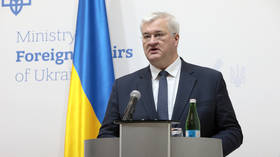Clean up or pay up – UK told

The European Union is threatening the United Kingdom with heavy daily fines unless it cuts air pollution. But many Brits remain blissfully unaware of the serious implications of pollution.
The UK has been risking the health of people living in towns and cities by constantly breaking air pollution laws. The “dangerously high levels” of pollution have caused the European Union to start legal proceedings, which could lead to unlimited daily fines.
Industry is amongst the worst offenders. And despite the environment agency’s “name and shame” policy, which was implemented to deter companies from committing pollution offences, an alarming number of large firms are continuing to breach pollution regulations.
Scottish cities are the worst culprits and consequently are facing stricter controls than the rest of the UK.
Traffic seems to be the main polluter, prompting the EU to warn the Scots to end their “love affair with the car” or face significant fines. Professor Jon Ayres from Aberdeen University said: “unless someone comes up with a way of building a stunning new electric rail and tram system in the timescale involved, we won’t see a significant difference by 2010.
He added that any “improvement will take a major cultural shift. As long as we are in love with the car very little will change.”
But air pollution is not confined to the boundaries of Scotland. EU documents have revealed that more than 20 towns and cities in Britain have dangerous levels of nitrogen dioxide, ozone and particulates in the atmosphere, known as PM10s.
The main problem is that many people remain unaware of the severity of the implications of air pollution.
Simon Birkett of the Campaign for Clean Air in London has advocated banning cars from city centres as the only way to combat the problem. ”Air pollution killed three times as many people in the UK last year than passive smoking did, but which one did the government tackle first?“ he asked.
The mayor of London seems to be among those nonchalantly oblivious to the dangers of air pollution. Boris Johnson announced this week that the third phase of London’s low emission zone was to be delayed, as it would have a “detrimental impact” on small businesses in the current economic climate.
The measure, due to start next year, would have imposed stricter emission standards on small commercial vehicles, such as vans and minibuses. Failure to comply with the new standards would have resulted in a £500 fine. Defending his decision, the mayor said: ”I am confident we can lower emissions in more imaginative ways. These include the introduction of hybrid and hydrogen fuel cell buses, a £1 million trial of low carbon technology in London’s taxi fleet and a city bike hire scheme.“
The move has been condemned by the Green Party, who described it as an “absolute disaster for London’s environment”.
Darren Johnson from the party said “the mayor is talking green while condemning Londoner’s to more premature deaths and more pollution.”
A smog hangs over Manchester, another major polluter and the UK’s third largest city.
Its residents and commuters may not have rejected a proposed city-centre congestion charge if the government had made more of an effort to inform the public of the serious health impacts of air pollution caused by traffic.
Ron Bradshaw, a regular commuter into Manchester said: ”I would gladly ditch my car for the train or tram if it meant improving the health of the city; as it happens I wasn’t informed of the severity of the health consequences, and I voted no to the congestion charge."
Unless there are some major cultural shifts and changes in attitude towards pollution in the UK, it seems many company bosses and drivers my face some heavy fines from the EU and the future air of Great Britain will remain murky.
Gabrielle Pickard for RT















